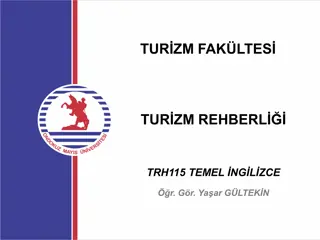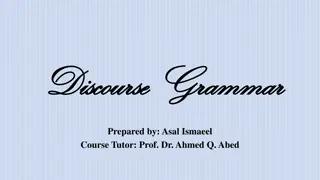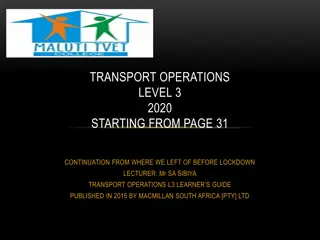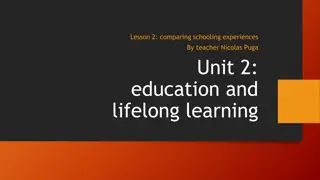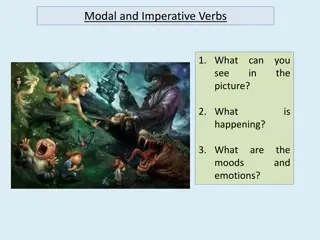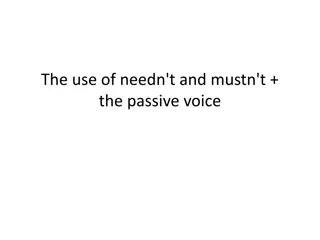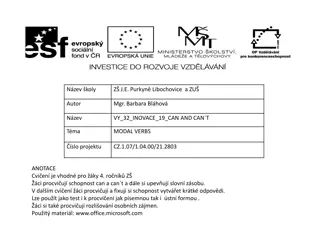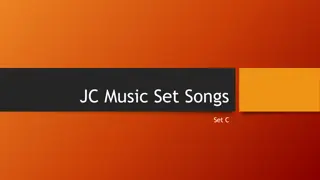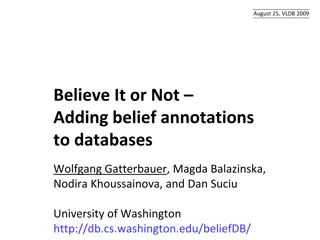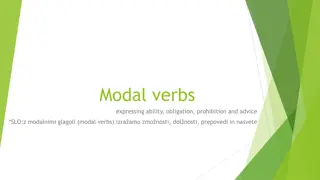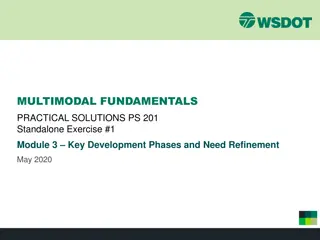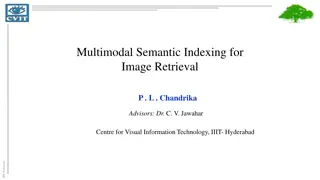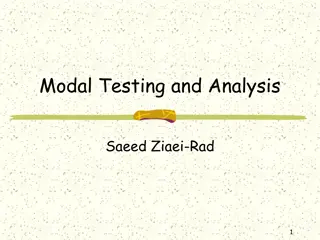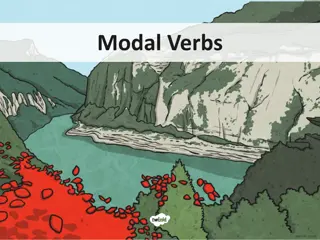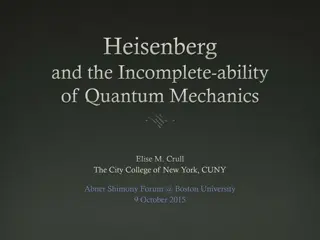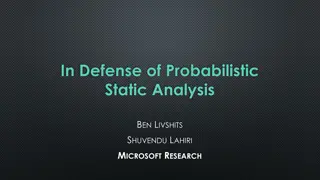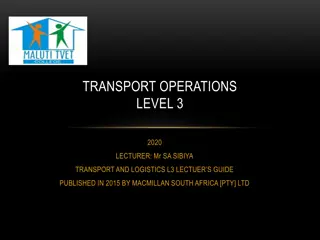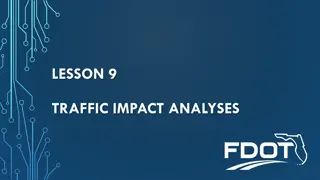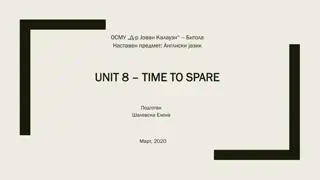Dos & Don'ts: Traffic Signs and Modal Verbs
Learn the meaning of traffic signs and practice using modal verbs in this English lesson. Improve your reading, listening, and writing skills.
9 views • 33 slides
Assertive to Interrogative: English Grammar Exercises and Practice
Enhance your English grammar skills with exercises on changing assertive sentences into interrogative ones. Learn how to transform sentences using auxiliary verbs, modal verbs, and without auxiliary verbs through practical examples and practice questions. Improve your sentence structure and comprehe
4 views • 24 slides
MAKING RECOMMENDATIONS
Providing recommendations is a crucial skill in both spoken and written English, especially for tasks like formal essays, reports, proposals, and letters. This guide covers different ways to give recommendations using modal verbs, passive voice, gerunds, and more. Get insights on modal/semi-modal ve
6 views • 16 slides
Effective Assessment Strategies in Educational Testing
The importance of choosing the right assessment strategy in educational testing is highlighted, focusing on the use of multi-modal assessments and the selection between Selected Response and Constructed Response methods. Considerations for maximizing content validity, cognitive complexity, and authe
1 views • 19 slides
Comprehensive Cost Management Training Objectives
This detailed training agenda outlines a comprehensive program focusing on cost management, including an overview of cost management importance, cost object definition, cost assignment, analysis, and reporting. It covers topics such as understanding cost models, cost allocations, various types of an
4 views • 41 slides
Modal Verbs in English
Modal verbs, also known as modals, are auxiliary verbs that express attitudes and levels of certainty in English. They serve various purposes, such as indicating certainty, ability, permission, and making requests. Modal verbs like can, could, may, might, will, would, must, shall, should, and ought
0 views • 19 slides
Decarbonising Multimodal Logistic Chains: Best Practices Panel in Hamburg
Explore key discussions from the 13rdERA Multimodal conference Panel III in Hamburg focusing on decarbonising multimodal logistic chains. The panelists, including Nicolas Albrecht from Cargobeamer, Andr Düring from Alstom, and Matthias Knöpling from VTG, shared insights on shifting towards sustain
1 views • 6 slides
Year 5 & 6 SPAG Curriculum Overview
Explore the Year 5 & 6 SPAG curriculum covering prefixes, suffixes, nouns, pronouns, adverbs, clauses, modal verbs, adverbials, cohesion, and punctuation. Understand how to convert words, form sentences, and enhance writing skills.
0 views • 19 slides
Modal Verbs: Epistemic and Deontic Uses
Modal verbs, such as can, could, may, must, will, and should, play a crucial role in expressing modality in English. This content discusses the epistemic and deontic uses of modal verbs, illustrating how they convey likelihood, ability, permission, suggestions, obligations, and advice. Explore the n
1 views • 34 slides
Grammar in Discourse: A Comprehensive Analysis
Recent discourse-based perspectives on grammar discuss how linguistic items exhibit diverse patterns when analyzed within longer texts. Scholars like Hughes, McCarthy, Halliday, and Hassan emphasize the cohesion and unity of texture in text through grammar and vocabulary patterns, connecting meaning
3 views • 34 slides
Intermodal Transport Operations in Supply Chains
Explore the interrelationship of transportation services, multi-modalism, and safety legislation in the field of transport operations, referencing a comprehensive learner's guide. Topics covered include seamless supply chains, modal options, safety legislation, modal movement requirements, and more.
1 views • 14 slides
Comparing Schooling Experiences in Different Cultural Backgrounds
Explore educational realities in various cultural and economic settings through activities focusing on vocabulary, modal verbs, video analysis, and language comparison. Practice language skills by completing activities related to school experiences in Japan, China, and the Democratic Republic of Con
2 views • 7 slides
Modal and Imperative Verbs: Usage and Examples
This content covers the explanation and examples of modal verbs, which express certainty, possibility, and obligation, as well as imperative verbs that denote commands and orders. Learn to identify and use these verb types accurately and creatively through practical examples and engaging activities.
2 views • 12 slides
Analysis of Students' Homework Time Distribution
The histogram illustrates the time distribution of students spent on homework. The analysis includes determining the number of participants, proportion spending less than 5 minutes, percentage spending more than 30 minutes, mean time estimation, modal class identification, interquartile range calcul
0 views • 8 slides
English Modal Verbs: A Visual Guide
Explore the world of English modal verbs through engaging infographics covering must, can, may/might, could, and should. Learn about their usage in sentences and grasp the nuances of expressing ability, permission, obligation, and possibility. Dive into the explanations with visual aids depicting sc
1 views • 33 slides
Modal Verbs in English Grammar
Explore the nuances of modal verbs in English grammar through opinion, advice, and exercises. Learn how to use modal verbs like should, ought to, can, must, and may in present and future contexts. Enhance your language skills with examples and exercises highlighting the correct usage of modal verbs.
2 views • 12 slides
Effective Use of "Needn't" and "Mustn't" in Passive Voice
Understanding when to use "needn't" and "mustn't" in the passive voice can enhance your language skills. "Needn't" is used to express lack of necessity, while "mustn't" indicates prohibition or strong advice. Incorporating these modal verbs in the passive voice adds depth and clarity to your communi
0 views • 4 slides
Modal Verbs Exercise - Can and Can't Practice Activities
Enhance students' ability to use modal verbs can and can't through engaging exercises focusing on forming questions and short answers. Utilize the provided images to prompt students to complete sentences and questions with appropriate modal verbs.
1 views • 5 slides
Overview of Sacred Music: Plainchant, Gregorian Chant, and Modal Music
Delve into the world of sacred music with a focus on Plainchant, Gregorian Chant, and Modal Music. Explore the history, characteristics, and unique features of these musical forms, ranging from the reverent tones of Salve Regina to the intriguing melodies of Modal Music. Discover the textures, moods
0 views • 10 slides
Managing Belief Annotations in Databases: A Modal Logic Approach
Explore the concept of belief databases that enable data curation based on modal and default logic in a relational model. The work discusses managing inconsistent views in community databases and presents a motivating application scenario to illustrate the challenges and solutions in handling belief
0 views • 34 slides
Modal Verbs for Ability, Obligation, Prohibition, and Advice
Modal verbs play a crucial role in expressing ability, obligation, prohibition, and advice in English. They help convey various nuances in meaning such as capability, necessity, restrictions, and suggestions. By exploring modal verbs like "can", "could", "must", and others, you can develop a deeper
1 views • 9 slides
Evaluating Purpose and Need Statements for Transportation Improvement Projects
This content discusses the evaluation and critique of purpose and need statements for transportation improvement projects focusing on roadway capacity and safety enhancements. It outlines the deficiencies in existing infrastructures, such as congestion, crash frequency, and future traffic projection
0 views • 14 slides
Power System Dynamics and Stability: Modal Analysis and PSSs
This lecture discusses modal analysis and Power System Stabilizers (PSSs) in power system dynamics and stability, covering topics such as eigenvalue calculations, generator models, and exciter effects. Key papers and examples are provided to enhance understanding and application in power systems eng
0 views • 27 slides
Multimodal Semantic Indexing for Image Retrieval at IIIT Hyderabad
This research delves into multimodal semantic indexing methods for image retrieval, focusing on extending Latent Semantic Indexing (LSI) and probabilistic LSI to a multi-modal setting. Contributions include the refinement of graph models and partitioning algorithms to enhance image retrieval from tr
1 views • 28 slides
Beauty and the Beast: A Clever Parody Analysis
Explore the cleverly ironic parody of "Beauty and the Beast" by Celsea Copas through a rhetorical analysis, modal choices, challenges faced in utilizing a Fakebook tool, successes in modern humor, and suggestions for improvement in a new Fake Facebook generator. Detailed images and external sources
0 views • 8 slides
Modal Verbs in Grammar - Mega Goals 6 Unit 1 Everyone Makes Mistakes
Modal verbs play a crucial role in expressing abilities, possibilities, and obligations in English grammar. This lesson from Mega Goals 6 Unit 1 covers modal verbs, passive voice, and past models, offering a comprehensive overview through various activities and examples.
1 views • 25 slides
Modal Testing and Analysis in Structural Dynamics
Modal testing and analysis play a crucial role in understanding the behavior of structural systems under various conditions like undamped, viscously damped, and hysterically damped scenarios. This analysis involves the study of single-degree-of-freedom systems, undamped systems for free and forced v
0 views • 23 slides
Modal Verbs: Usage and Examples
Modal verbs are auxiliary verbs that are used in conjunction with main verbs to express various meanings such as possibility, likelihood, necessity, and more. Common modal verbs include may, must, could, should, and will. They play a crucial role in indicating the level of certainty or permission in
4 views • 16 slides
Modal Verbs in English
Modal verbs in English such as 'must', 'have to', 'mustn't', and 'don't have to' are used to express obligations, prohibitions, and lack of necessity. 'Must' and 'have to' convey internal and external obligations, while 'mustn't' indicates prohibition and 'don't have to' implies lack of necessity. E
1 views • 14 slides
Encouraging Shift to Rail for Sustainable Travel
Explore strategies and insights on encouraging a modal shift to rail transport for a more sustainable travel future. Join industry experts at the GBTA Sustainability Summit to discuss modal share, market trends, and the role of high-speed rail in reducing emissions. Learn about sustainability, multi
0 views • 6 slides
Heisenberg and the Incomplete Ability of Quantum Mechanics
A nuanced exploration of Heisenberg's role in the history of Modal Interpretations, revealing how he anticipates MIs. Discussions include contemporary views, Dieks' explanations on modal interpretations, and Heisenberg's stance on quantum propensities. The presentation emphasizes the transition from
0 views • 14 slides
Introduction to Static Analysis in C.K. Chen's Presentation
Explore the fundamentals of static analysis in C.K. Chen's presentation, covering topics such as common tools in Linux, disassembly, reverse assembly, and tips for static analysis. Discover how static analysis can be used to analyze malware without execution and learn about the information that can
1 views • 54 slides
Industrial, Microbiological & Biochemical Analysis - Course Overview by Dr. Anant B. Kanagare
Dr. Anant B. Kanagare, an Assistant Professor at Deogiri College, Aurangabad, presents a comprehensive course on Industrial, Microbiological, and Biochemical Analysis (Course Code ACH502). The course covers topics such as Industrial Analysis, Microbiological Analysis, and Biochemical Analysis. Dr. K
1 views • 16 slides
Benefits of Probabilistic Static Analysis for Improving Program Analysis
Probabilistic static analysis offers a novel approach to enhancing the accuracy and usefulness of program analysis results. By introducing probabilistic treatment in static analysis, uncertainties and imprecisions can be addressed, leading to more interpretable and actionable outcomes. This methodol
0 views • 11 slides
Multi-Modal Transportation in Logistics
The content covers concepts such as inter-modal and multi-modal transportation, seamless supply chains, standard containers, swap bodies, cellular container ships, and unaccompanied road semi-trailers in the context of transportation operations. It explains the meanings and functions of various mode
0 views • 14 slides
The Importance of Traffic Impact Analysis in Transportation Planning
Traffic impact analysis plays a crucial role in evaluating the effects of proposed developments on transportation infrastructure. This analysis helps in identifying the potential burden on the community's transportation network and ensures that growth is managed effectively. By examining short- and
0 views • 60 slides
Effective Language Learning: Vocabulary, Grammar, and Modal Verbs Activities
Enhance your language skills with engaging vocabulary exercises, definitions matching, and practice with modal verbs. Dive into a variety of educational tools, improve your understanding with video explanations and PDFs, and master different types of present modal verbs. Elevate your language learni
0 views • 16 slides
Oil Industry Segment Update and Global Trends Analysis
This update provides insights into the oil industry segment, focusing on global production and consumption trends, US refinery input, crude oil imports and exports, oil land rig count, and North Dakota production modal share. The data includes key statistics, such as top global crude oil producers,
0 views • 9 slides
MY PARENT’S JOB
Discover the world of jobs, law, and grammar through engaging activities and explanations. Explore the roles of parents, legal professionals, and teachers. Understand the concepts of possession, legal issues, and modal verbs. Enhance your language skills with exercises on homeroom, court matters, an
0 views • 8 slides
Decidability and Extensions of Modal Epistemic Logics
The research delves into the introduction of the new modal epistemic logic E.P, derived from the infinitely valued ukasiewicz logic by incorporating an axiom of the logic P of perfect MV-algebras. The study explores the enrichment of the language with a "quasi-knowledge operator" and establishes the
0 views • 30 slides








